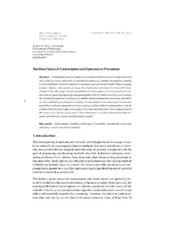The Moral Status of Contraception and Openness to Procreation
Moralnost uporabe kontracepcije i otvorenost prokreaciji
Апстракт
Permissibility of contraception as a method of birth control is closely connected with issues of moral justification of reproductive autonomy, namely the question whether or not individuals should be allowed to autonomously and freely decide if they are going to have children, when and how many. The development of medical and scientific technologies led to the usage of artificial methods of contraception that can prevent conception with the goal of postponing and planning the birth of a child. In the first part I analyse the bioethical arguments that appear in debates about reproductive autonomy and which can be mobilized against the permissibility of contraception. In the second part I have compared the bioethical arguments to those used against the artificial contraception in the literature about the philosophy of sexuality. In the third and final part, I have argued against the stance of G.E.M. Anscombe and J. Finnis that there is morally relevant distinction between artificial and ...natural methods of birth control.
Кључне речи:
intention / reproductive autonomy / philosophy of sexuality / bioethics / contraceptionИзвор:
Filozofija i društvo/Philosophy and Society, 2012, 4-18Институција/група
IFDTTY - JOUR AU - Prijić-Samaržija, Snježana PY - 2012 UR - http://rifdt.instifdt.bg.ac.rs/123456789/528 AB - Permissibility of contraception as a method of birth control is closely connected with issues of moral justification of reproductive autonomy, namely the question whether or not individuals should be allowed to autonomously and freely decide if they are going to have children, when and how many. The development of medical and scientific technologies led to the usage of artificial methods of contraception that can prevent conception with the goal of postponing and planning the birth of a child. In the first part I analyse the bioethical arguments that appear in debates about reproductive autonomy and which can be mobilized against the permissibility of contraception. In the second part I have compared the bioethical arguments to those used against the artificial contraception in the literature about the philosophy of sexuality. In the third and final part, I have argued against the stance of G.E.M. Anscombe and J. Finnis that there is morally relevant distinction between artificial and natural methods of birth control. T2 - Filozofija i društvo/Philosophy and Society T1 - The Moral Status of Contraception and Openness to Procreation T1 - Moralnost uporabe kontracepcije i otvorenost prokreaciji SP - 4 EP - 18 DO - 10.2298/FID1204004P ER -
@article{
editor = "Milidrag, Predrag",
author = "Prijić-Samaržija, Snježana",
year = "2012",
abstract = "Permissibility of contraception as a method of birth control is closely connected with issues of moral justification of reproductive autonomy, namely the question whether or not individuals should be allowed to autonomously and freely decide if they are going to have children, when and how many. The development of medical and scientific technologies led to the usage of artificial methods of contraception that can prevent conception with the goal of postponing and planning the birth of a child. In the first part I analyse the bioethical arguments that appear in debates about reproductive autonomy and which can be mobilized against the permissibility of contraception. In the second part I have compared the bioethical arguments to those used against the artificial contraception in the literature about the philosophy of sexuality. In the third and final part, I have argued against the stance of G.E.M. Anscombe and J. Finnis that there is morally relevant distinction between artificial and natural methods of birth control.",
journal = "Filozofija i društvo/Philosophy and Society",
title = "The Moral Status of Contraception and Openness to Procreation, Moralnost uporabe kontracepcije i otvorenost prokreaciji",
pages = "4-18",
doi = "10.2298/FID1204004P"
}
Milidrag, P.,& Prijić-Samaržija, S.. (2012). The Moral Status of Contraception and Openness to Procreation. in Filozofija i društvo/Philosophy and Society, 4-18. https://doi.org/10.2298/FID1204004P
Milidrag P, Prijić-Samaržija S. The Moral Status of Contraception and Openness to Procreation. in Filozofija i društvo/Philosophy and Society. 2012;:4-18. doi:10.2298/FID1204004P .
Milidrag, Predrag, Prijić-Samaržija, Snježana, "The Moral Status of Contraception and Openness to Procreation" in Filozofija i društvo/Philosophy and Society (2012):4-18, https://doi.org/10.2298/FID1204004P . .



